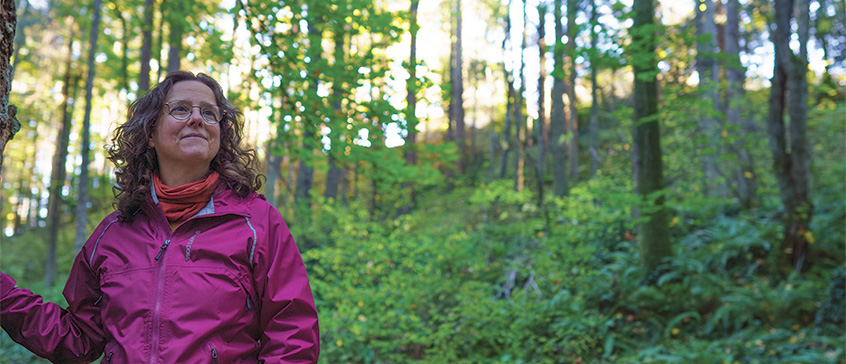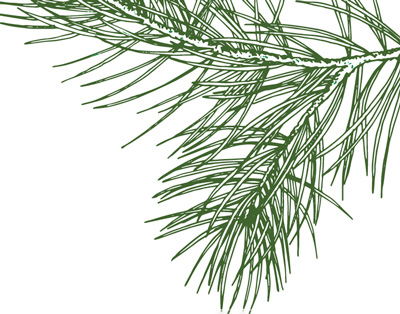Home / Science and the Environment / From Trees to People: The Social Phenomenon of Climate Change
From Trees to People: The Social Phenomenon of Climate Change


with instructor Dr. Kara Shaw
By Sarah Androsoff and Portia Yip, Marketing Services
Environmental Studies professor Dr. Kara Shaw led the development of two programs with Continuing Studies at UVic (Transformative Climate Action and Climate Action Planning). The newest of the two is the Climate Action Planning program—a micro-certificate that blends policy, social justice and science. She hopes that learners are empowered to implement effective and collaborative action in their communities.
"There's not a problem with the environment, there's a problem with how we are living in it," says environmental studies instructor Dr. Kara Shaw. Climate change is a social phenomenon and our society's structure is why the climate crisis continues to rapidly grow. "There is good research into the science of climate change, but what's slowing down solutions is not knowing how to change our economies and societies," explains Kara. From her experience of studying dynamics of change, she realized that the root causes of environmental problems are hidden within society, not nature. "If you want to save trees, you need to study people and how we live together."
Before shifting to the field of environmental studies, Kara earned three degrees in politics, which help her analyze climate change through a political lens. She holds a Bachelor of Arts in Politics from the University of California and a master's degree and PhD in Political Science from Johns Hopkins University. After finishing her studies, she moved to England in 2000 to teach in the School of Politics, International Relations and the Environment at Keele University. In 2003, Kara came back to Canada to start a new chapter in her career and became an assistant professor in the School of Environmental Studies at the University of Victoria (UVic).
"If you want to save trees, you need to study people and how we live together."
Kara was the director of the School of Environmental Studies at UVic from 2014 to 2019. In this role, she had the opportunity to engage with the Restoration of the Natural Systems (RNS) program, which is a partnership program between Environmental Studies and the Division of Continuing Studies. Instantly, she noticed the value of continuing education. "I was intrigued by how hands-on the programs were, while also being rigorous and intellectually demanding," continues Kara.
As a lifelong learner herself, Kara researches the energy dynamics of climate change with engineers at UVic, and collaborates with local governments and community organizations seeking to implement climate policy and programs. These collaborations encouraged her to build educational opportunities for others seeking climate solutions. "There is a strong demand for more capacity in the area of climate action, and this requires understanding what solutions are possible and how to implement them," she says.
Since the fall of 2023, Kara has led the development of two programs with Continuing Studies at UVic (Transformative Climate Action and Climate Action Planning). The newest of the two is the Climate Action Planning program—a micro-certificate that blends policy, social justice and science so learners become empowered to implement effective and collaborative action across various communities. When asked what influenced her to develop these programs, Kara shares, "Climate change is so complex. It feels like there's nothing you can do. There's a sense of climate anxiety in the community but people still want to figure out how to get involved."
"The most important thing you can do about climate change is to talk about it and be curious."
Kara also turned to Continuing Studies to design these programs because she valued the culture of diverse students supporting and teaching each other. "Addressing climate change requires collaboration, and these programs create classrooms that prioritize collaboration, for example between working professionals and undergraduate students," adds Kara. She finds that working professionals contribute valuable experience and undergraduates bring a lot of excitement and dynamism to the table. These certificate programs include both collaborative and independent assignments, and a chance for students to engage with organizations in their community.
Kara suggests, "The most important thing you can do about climate change is to talk about it and be curious." To engage diverse groups and develop new ideas, we need to talk about climate change with our family, friends, neighbours and co-workers. From many years of teaching and interacting with different people, Kara developed a message she lives by and passes on to others. "Connect, critique, respect," says Kara. "It's important to connect with things you love, to find a niche to work in that nurtures yourself and your communities. Critique keeps you self-reflective, open to learning and to change. Finally, respect for the integrity of other people as well as for ecological limits helps to guide effective action."

- Posted December 5, 2023
Visit Registration
2nd Floor | Continuing Studies Building University of Victoria Campus 3800 Finnerty Road | Victoria BC | CanadaTel 250-472-4747 | Email uvcsreg@uvic.ca
2026 © Continuing Studies at UVic
Legal Notices |
Sitemap


